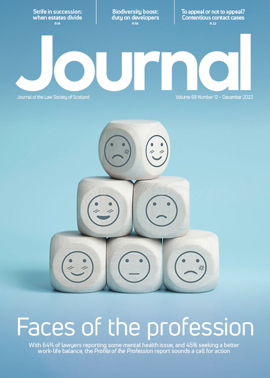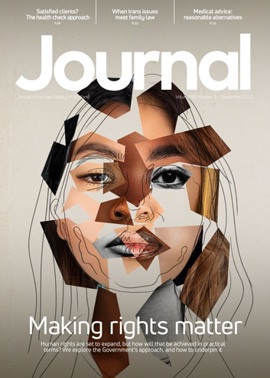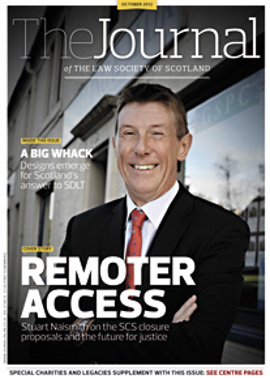Human trafficking: is the system responding?
Most people in Scotland would probably say that they have never met a victim of human trafficking, or had first-hand experience of traffickers or the world in which they operate.
Despite this, the Equality & Human Rights Commission (EHRC) and many agencies working in law enforcement, and with victims, know that trafficking is a problem in Scotland. It is a human rights abuse of terrible consequence, and it feeds off inequality.
At the EHRC, our remit is to protect human rights and promote equality throughout Britain. Human trafficking was an area where we believed we could make a significant difference through our statutory powers.
With agreement from the Scottish Human Rights Commission, with whom we share our human rights remit in Scotland, we launched our formal inquiry into human trafficking in Scotland in February 2010 with Baroness Helena Kennedy QC as investigating commissioner.
This inquiry was carried out under s 16 of the Equality Act 2006. Our aim was to find out more about the extent of trafficking in Scotland, to understand its underlying influences and causes, and to identify where policy and practice should change.
A report of what the inquiry uncovered, and making 10 recommendations, was published in November of last year. It was widely welcomed, most notably by the First Minister, Alex Salmond. Now, nearly one year on, we are planning a review to examine to what extent our recommendations have led to change.
Uncovered
When we started our inquiry, there had been no successful prosecutions for trafficking in Scotland, despite targeted legislation, and evidence that trafficking was taking place. While there has now been one successful prosecution, resulting in two convictions in September 2011, this is an ominously small number compared to over 150 prosecutions in England & Wales.
As part of our inquiry, an unprecedented evidence-gathering exercise was undertaken to try to make sense of this and to shed some light on the true nature of trafficking in Scotland. The evidence gave a picture of the unseen and under-reported nature of trafficking, as one victim reported:
“I was kept in a room with my daughter. The door to my room was always locked and I was not allowed out. When men came, [trafficker] would unlock the door and take my daughter away from the room; she would also tell me to get myself ready... When the men came in the room they would tell me what they wanted. I just did it because I had to... While I was with these men I could hear my daughter crying in the other room. It was terrible. When the men were finished they would use the bathroom and then leave. I never saw any money.”
This and other, equally excruciatingly tragic, stories exposed who the victims were and how they were approached and controlled by traffickers through deceit, manipulation, debt bondage, threats and violence.
The key recommendations
- A “system-wide” strategic response, led by the Scottish Government
The complexity of the crime and variety of causes mean that there is a need for a “system-wide” strategic response. Human trafficking can only be tackled effectively through a comprehensive multi-agency strategy, led by the Scottish Government. This approach should involve law enforcement and prosecution services, victim support organisations, local authorities, and the private sector.
- Raising awareness of trafficking and its indicators
The fact that there has been only one successful prosecution in Scotland, and the low levels of public and professional awareness of human trafficking and its indicators, were also highlighted. Practitioners in frontline roles, i.e. police, local authorities, immigration solicitors, social workers, education and health workers, need to receive training to spot victims of trafficking and to act appropriately. Otherwise, the problem will continue to go unnoticed and unchallenged, particularly as many victims are reluctant – or too terrified – to report the crime, or struggle to come forward as witnesses in court proceedings.
But what else is relevant in ensuring that traffickers are being punished and dissuaded, and that justice for victims is secured?
- Need for legislative change
There needs to be clarity that trafficking is primarily a criminal and human rights issue, rather than one of immigration. During the inquiry, we listened carefully to evidence from experts and practitioners in Scotland’s law enforcement community. It became clear that there seems to be no thorough and dedicated consideration, in Scotland and the UK, of how trafficking can be dealt with through criminal law.
There needs to be clarity in the law as to what constitutes human trafficking. Current legislative inconsistencies, for example, have led to lack of clarity on the types of activities to be considered as trafficked exploitation. This stands in the way of legal certainty and law enforcement and dilutes the nature of the crime of trafficking, making it harder to secure convictions under these offences.
This is particularly topical as the Scottish and Westminster Governments have until April of 2013 to bring relevant law in line with the EU Directive on Preventing and Combating Trafficking in Human Beings and Protecting Victims. However, there is no mention of human trafficking in the Scottish Government’s legislative programme 2012-13. Does this mean that the Scottish Government is satisfied that there are no further legislative measures required to ensure compliance with the directive?
Based on the evidence received, we recommended a review of existing human trafficking legislation, to bring it together in a comprehensive Human Trafficking Bill. We also proposed that a “human trafficking background” should be a statutory aggravation in the sentencing of those convicted of related criminal offences, such as sexual assault or forced labour. This recommendation was immediately endorsed by the Lord Advocate, Frank Mulholland QC.
The one-year-on review
As a direct response to our recommendation for a “system-wide” strategic response, the Scottish Government is bringing together key stakeholders at a summit on human trafficking on 18 October. It is hoped that this will be the start of the development, implementation and co-ordination of a new multi-agency strategy on human trafficking that uses all relevant policy levers and legislation, and that a timetable for action will be forthcoming.
Other recommendations focused on the need for an independent system for victim identification, and deciding on their trafficking status and appropriate victim support. All of our inquiry’s recommendations are designed to help make Scotland a more hostile environment for traffickers, as well as helping to identify victims and support their recovery. The one-year-on review on the impact of the inquiry’s 10 recommendations, to begin later this year, will show whether and how the Scottish Government and all those other stakeholders with a responsibility for anti-trafficking have paid regard to them.
Baroness Kennedy had this to say: “Human trafficking is one of those pressing contemporary issues which speaks to the nature of our societies. It tests the value we attach to the humanity of others. It speaks to who we are as a people. Confronting it involves collaboration. I am hoping that Scotland will pioneer a zero-tolerance approach to human trafficking.”
In this issue
- Players and winners
- Access to client money?
- Tax and residential property
- Trusts and the family business
- Planning: the next level
- Reading for pleasure
- Opinion: Tom Mullen/Alan Paterson
- Council profile
- Book reviews
- President's column
- Deed plan criteria
- Decision time for justice
- "Can do": can you?
- Taxes heading north
- When the agent answers
- Taking care of child cases
- Collective redress
- Making sense of hearsay rules
- Don't forget the register
- Alcohol: the healthy option
- Seeding scheme is a draw
- Scottish Solicitors' Discipline Tribunal
- Human trafficking: is the system responding?
- Power points and positive rights
- A way to apply yourself
- Society presents "ambitious plans"
- Law reform roundup
- Business benefits
- On the right track
- Ask Ash
- Business radar
- Legacies: the untapped potential
- Charity begins at law
- Love them and leave to them
- Those difficult relatives






